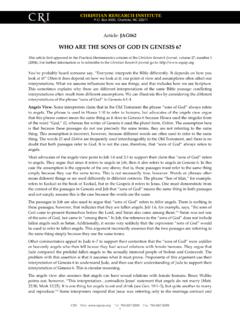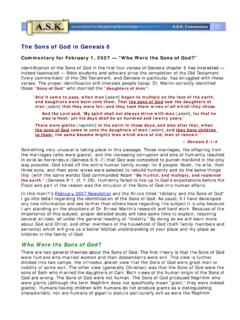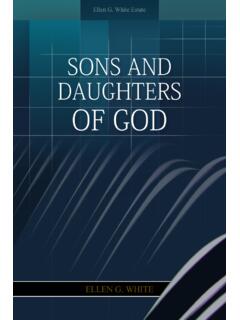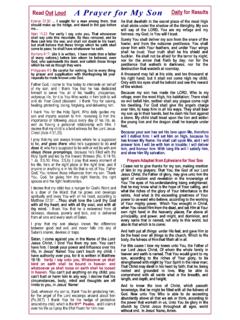Transcription of Who are the Sons of God in Genesis Chapter 6?
1 Who are the sons of god in Genesis Chapter 6? Part 1: Properly Engaging the Scriptures By Steve Schmutzer Steve s Website Contact Steve Steve s Article Podcast Steve s Daniel Class Podcast A curious portion of Scripture is found in Genesis 6:1-4. For most of my life these verses struck me as a little odd, and I know others who still see them that way. But after studying these verses for a few years, I m fascinated with this divinely-inspired text. I feel its message provides clarity to other passages within the Old Testament and the New Testament.
2 I am also quite sure that one s grasp of the prophetic Scriptures will fall short if the implications of Genesis 6:1-4 are not properly understood. I want to back up a few paces to lay a foundation, and that calls for some personal history. About ten years ago, the Lord led me to teach a class at my church that I still teach. My life is a busy one, but that class is a huge blessing to me and I m humbled to hear it s the same for so many others. If the Lord wills it, I ll continue to teach it as I have been doing.
3 As I have been doing. There is weight to those words. There are standards I try to maintain as I teach. These are convictions I have that shape how I do what I do. Properly handling the Word of god is an immense responsibility whether I am speaking about it or writing about it. With the subtitle of this article in view, and with the premise that Genesis 6:1-4 deserves the same reverence as any other portion of the Bible, here are my standards as I teach God s Word. I offer them in no particular order: I believe in expository teaching.
4 I define this to mean that, whenever possible, it s important to explain the precise meaning of a given portion of Scripture. As I maintain this standard from one verse to the subsequent one, I m most enabled to receive and declare the message God intended those specific passages to communicate. And because I believe the Bible was intended to be read and understood literally with legitimate figures of speech having their proper place then I believe it says what it means and it means what it says.
5 If I choose instead to assume the Bible is vague and unclear, then I have stained its Divine Author with the same brand. It takes discipline and humility to yield to the intentions of any Biblical text, and this is especially true if its message conflicts with my individual partialities. I ve learned this expositional discipline is a two-sided coin. As one side of it adheres to teaching what IS there, the other side avoids teaching what is NOT there. I m convinced that efforts to extract an alternate derivative from a passage that is plainly moving in a different direction are unwise at the least and apostate at the worst.
6 This process of investigating the intentions of Scripture with the goal of arriving at its proper interpretation is commanded by the Bible itself. In 2 Timothy 2:15 it says, Be diligent to present yourself approved to God as a workman who does not need to be ashamed, accurately handling the word of truth (NASB). This says there s an accurate way to communicate God s Word which also means there s an inaccurate way to do the same thing. Imposing my own biases upon a specific Biblical passage would be a serious mistake.
7 It is disconcerting that the habits of cults and many churches are not too dissimilar since both groups deliberately massage and manipulate the Scriptures to mean something other than what s really being said. Both groups find it necessary to limit the Bible s divine power and impact to achieve their own agenda. I believe in avoiding political-correctness. The crux is this: I cannot properly teach the truth of god s perfect Word without crossing the grain of man s imperfect condition.
8 If the intent of the Scriptures somehow offends the preferences of some people, so be it. This issue acknowledges the one-cannot-serve-two-masters principle. To be right with God has generally meant to be wrong with man, and that s seldom been more evident than now. Political correctness has a problem stating the plain truth plainly and so it s not an ally of sound doctrine. Since God s truth is measured by divine parameters, the chasm between pleasing man and pleasing God is immense.
9 When handling the Word of god , I must give constant effort to answering an important question, Whom do I really serve? The Bible deals with delicate issues forthrightly, which means God s standard is to teach those things the same way. Tip-toeing around uncomfortable themes or leap-frogging sensitive passages may satiate the crowd that doesn t want to rock the boat, but these are lukewarm stances to God and I believe He detests them. Whenever man s methods are esteemed, God s message is eroded.
10 Placating the world s passions to the compromise of Biblical truth is a slippery slope, and this conduct has no place in the intentional fellowship of the Body of Christ. I believe we should let the Bible interpret itself. This rule emerges, once again, from a Biblical reminder. In 2 Peter 1:20 we read, But know this first of all, that no prophecy of Scripture is a matter of one's own interpretation. (NASB) Two points emerge here: first, be convinced of the veracity of Scripture, and second, take your own biases out of the mix when handling God s Word.









